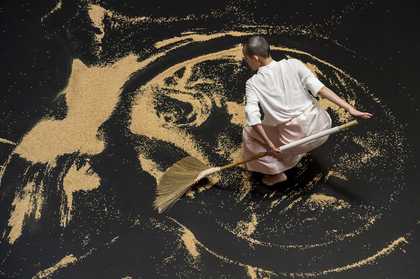
Lee Mingwei, Our Labyrinth, 2015-ongoing. Performance view at The Metropolitan Museum of Art, New York, 2020. Photo © Stephanie Berger.

Lee Mingwei, Our Labyrinth, 2015-ongoing. Performance view at The Metropolitan Museum of Art, New York, 2020. Photo © Stephanie Berger.
Lee Mingwei: Our Labyrinth
26 May – 15 June 2022 from 10:30-17:30 (and until 21:30 on 27 May)
Tate Modern, Turbine Hall
Admission free
On 26 May, Tate Modern will begin staging Our Labyrinth, a performance in the Turbine Hall by acclaimed artist Lee Mingwei. Taking place continuously over three weeks, this work is one of many new acquisitions to Tate’s collection which visitors can enjoy this summer at Tate Modern.
Our Labyrinth transforms the simple act of sweeping into a contemplative, gestural performance, bringing a sense of ritual into the gallery. Two dancers with bells tied to their ankles move slowly as they sweep grains of rice into patterns. Over time the dancers shape the grains into a series of labyrinthine paths on a floor shaped like a pool of ink. The work is inspired by the artist’s experience of visiting ancient temples in Myanmar, where paths leading from huts to temples are swept by volunteers. The performance has been staged in Taipei, Shanghai, Paris, Jakarta, Berlin, New York, and Tokyo, and the edition presented at Tate Modern is the first time the work has expanded to include two performers dancing at a time.
Born in Taichung, Taiwan in 1964 and currently living in Paris and New York City, Lee creates participatory installations exploring issues such as trust, intimacy, and self-awareness. He often takes everyday interactions as his starting point, from eating and sleeping to walking and conversation. Our Labyrinth was acquired for Tate’s collection in 2020 and is being staged for the first time as part of Tate Modern’s free displays, underscoring Tate’s commitment to live art and performance as an integral part of art history.
Alongside the performances of Our Labyrinth, visitors can explore a huge variety of new free displays at Tate Modern showcasing many recent acquisitions to Tate’s collection, spanning Asia, Africa, Europe, the Americas, and Oceania. Current highlights include rooms dedicated to work by Hera Büyüktaşçıyan from Turkey, Sammy Baloji from the Democratic Republic of the Congo, Yto Barrada from Morocco, Leonardo Drew from the USA, and Wael Shawky from Egypt, many of which are being shown at Tate Modern for the first time since joining the national collection. Another new room showcases a group of work by married artists Leon Golub and Nancy Spero, being donated to Tate by Jon Bird who worked closely with the artists for many years.
Further new displays will open in June, including a room devoted to the Lebanese artist Huguette Caland, whose abstracted depictions of the female body express joy and liberation. A painting from the 1970s and a kaftan which Caland decorated with two faces in profile kissing will be shown alongside a series of ten drawings donated to Tate by the artist before her death in 2019. Ming Wong’s playful exploration of cinema, performance and identity, Life of Imitation, will also go on show next month paired with a group of three photographs by Tseng Kwong Chi.
These will be followed in July by a display of recently acquired photographs by Martha Rosler and two photographic series by Laura Aguilar and Lyle Ashton Harris. Further photography displays will include a selection of photobooks documenting the war in Bosnia, with Šejla Kamerić's Bosnian Girl poster at its centre, as well as Liz Johnson Artur’s series Time don’t run here, depicting the Black Lives Matter protests in London over the summer of 2020. The display opens in late June and is accompanied by a new book about Artur by Tate Publishing. Finally, the acclaimed free exhibition A Year in Art: Australia 1992 will be updated with several works jointly acquired over the past year with the Museum of Contemporary Art Australia, including paintings by Mabel Juli, Noŋgirrŋa Marawili and Judy Watson and an installation by Yhonnie Scarce.
For press information contact Catherine.Poust@tate.org.uk.
A selection of high-resolution press images can be downloaded from Tate’s Dropbox site.